On March 20, 2020, the United States Treasury, Department of Labor, and the IRS announced detailed plans to combat the financial ramifications of COVID-19 or Coronavirus. Also known as the “Coronavirus Bill”, the Families First Coronavirus Response Act (FFCRA) quickly passed through the House of Representatives on March 14 before being signed formally into law on March 18, 2020. The new law outlines clear steps taken by the federal government to protect both individuals as well as small businesses. Read on to find out more.
Table of Contents
Background Details about the FFRCA
With the coronavirus outbreak reaching global pandemic levels, countries all over the world are struggling to cope. The H.R. 6201 summary calls for paid leaves, free testing and protection for public health workers, and offers several important benefits to American families during this time.
The new law takes immediate effect on Thursday, April 2, 2020, to remain in effect until December 31, 2020, subject to further changes in the economy or global marketplace that might require an amendment at a later date. For now, the entire country will have to wait to see how the Coronavirus Bill will impact small businesses, their hiring strategies, and their workforce.
Small Business Fears
In times of global pandemic, the security of small businesses becomes even more uncertain. The primary intent of the Families First Coronavirus Response Act is to allay these fears and enable small businesses to remain viable. The Act requires private-sector businesses with 500 or fewer employees to allow up to two weeks (eighty (80) hours) of paid Emergency Paid Sick Time (EPST). Qualifications for COVID-19 EPST extend to any employee unable to work (or telecommute) if they are:
- Experiencing symptoms of COVID-19 and seeking a formal medical diagnosis
- Advised by a medical professional to self-quarantine
- Subject to a federal, state, or local governmental quarantine
- Caring for an individual in quarantine, whether mandated or self-imposed
- Caring for a child as a result of school or daycare center closure
- Experiencing any medical symptoms substantially similar to COVID-19, as defined by the Secretary of Health and Human Services (fever, coughing, shortness of breath, loss of sensory taste and/or smell)
Individuals qualifying on the basis of #1, #2, or #3 are entitled to their standard rate of pay, capped at a maximum of five hundred eleven dollars ($511.00) daily. Individuals qualifying on the basis of #4, #5, or #6 are entitled to two-thirds of their standard rate of pay, capped at a maximum of two hundred dollars ($200.00) daily.
The Act also codifies the Emergency Family and Medical Leave Expansion Act (Emergency FMLA), which entitles employees with a tenure of thirty (30) days or more to the ability to take up to ten (10) weeks of protected job leave. In certain cases, this may be combined with Emergency Paid Sick Time for a total of twelve (12) weeks of paid time off. The ten weeks protected under the Emergency FMLA will be paid at a rate of two-thirds of the employee’s normal hourly or salaried rate, capped at a maximum of two hundred dollars ($200) per day and ten thousand dollars ($10,000) total for the duration of the leave.
Whether through EPST or the updated Emergency FMLA, you will have to work with your payroll branch or your recruitment agencies to ensure that employee payroll properly reflects your worker’s elections.
Updates on the FFCRA for Employers
To fund this initiative, and to reduce the impact on small businesses, payors are allowed to access payroll tax funds to take advantage of paid leave credits immediately. However, if the amount earmarked for the IRS is insufficient, the IRS will offer a streamlined way for employers to get a quick advance on future tax payments.
Exemptions Granted Under the FFCRA
Employers are required by the FFCRA to offer paid leave to employees satisfying any of the criteria outlined above. The following exemptions do apply, as a means of staving off the financial burden to the smallest businesses in the marketplace:
- Firms with less than fifty (50) employees may petition the Office of the Secretary of Labor to seek forgiveness on the basis of jeopardy to the organization’s business viability.
- Self-employed individuals will be allowed a tax credit in lieu of benefits.
- The bill does not apply to private firms with more than five hundred (500) employees.
It is a critical time to review your organization’s paid leave policy. If possible, work closely with niche specialist staffing partners to devise a strategy for protecting your workforce at this critical time. You need to be fair and impartial, while also keeping your business goals in mind.
